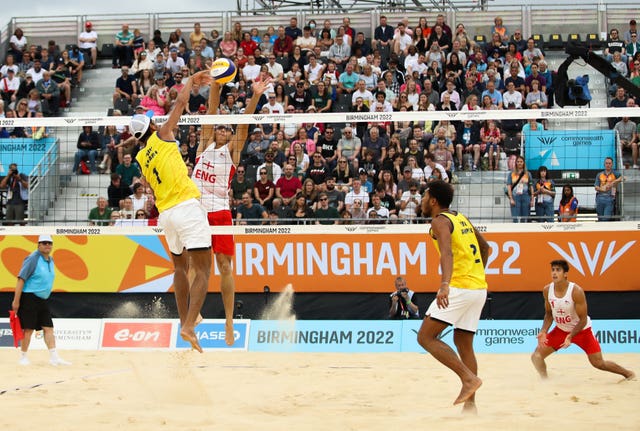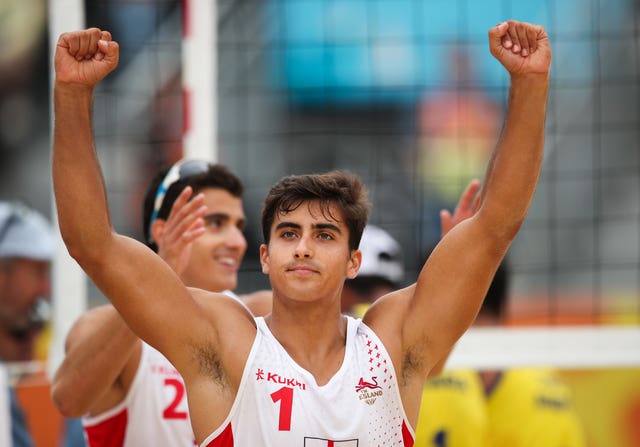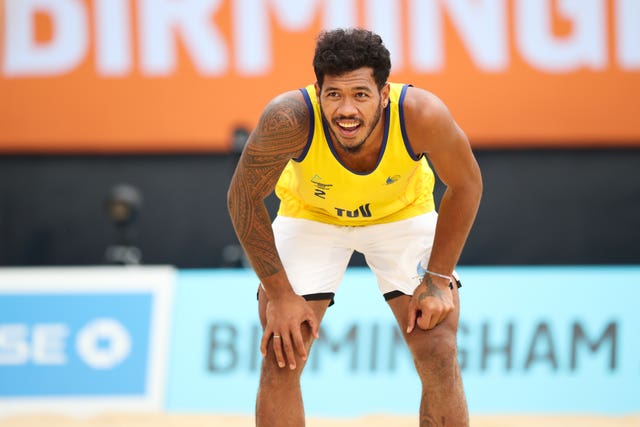Tuvalu’s beach volleyball players face disappearing sand due to global warming
The tiny Pacific archipelago can fit its entire population inside Villa Park – four times over.

Its entire population could fit inside Villa Park four times over, but the tiny Pacific archipelago of Tuvalu has the biggest possible reason to use its participation in the Commonwealth Games in Birmingham to stamp its identity on the world map.
Global warming is lapping at the fringes of the 26-square-kilometre nation with such haste that the majority of its five-strong team are forced to train on its airport runway, and its beach volleyball players routinely turn up to find the previous day’s practice court has succumbed to the waves.
“In these guys’ lifetime, if nothing changes their homeland won’t be there any more,” said Tuvalu’s Australian beach volleyball coach Marty Collins, after Ampex Isaac and Saaga Malosa lost their opening match 21-10 21-12 to England’s Javier and Joaquin Bello on the site of the former Smithfield fruit and vegetable market.

“They don’t really have a beach that’s wide and flat enough to set up a court. A few places they have had courts in the last few years aren’t really there any more, partly because of global warming.
“In the last few months they had to make a court in the outer islands which a couple of hours’ boat ride away. They went there and they had a little camp. Put it this way – they weren’t staying in hotels out there.”
The issue of its deteriorating borders has become so acute that Fiji has offered some of its islands for Tuvaluans to relocate. “They’re there if and when they need to move, but obviously that’s Plan B,” added Collins. “They want to stay because they have their own language and culture. Hopefully by being here they are putting a face to the situation.”
Collins has been appointed by the sport’s governing body, the FIVB, as part of a project to accelerate the growth of the sport in Pacific nations such as Tuvalu and Vanuatu. The success of the programme became evident in 2018, when Vanuatu’s women’s team won a shock bronze medal.
Isaac, 24, is a part-time construction worker who was convinced to switch from indoor volleyball, the island’s nominal national sport, six months ago. Malosa is a skin-diver and spear-fisherman who makes a living by selling much of what he catches at local markets.
The duo made an immediate impact, teaming to win Tuvalu’s first team medal in international sport when they took bronze at the Pacific Mini Games in the Northern Mariana Islands in June.

The pair face two more group games against New Zealand and Cyprus, while Tuvalu is also represented in Birmingham by two boxers and a 100-metre sprinter. A sixth team member, sprinter Temalini Manatoa, did not travel to the Games after failing to take a Covid test.
“This (global warming) is a very important issue for us,” said Isaac. “We are not just representing our people and our smaller population, but we are representing the whole of the Pacific islands.
“We don’t really have a proper place to train and none of our beaches are all level, they all slope. Some of the beaches are getting smaller.”
Isaac and Malosa completed their opening match in spitting rain, conditions almost as alien to the duo, whose homeland’s temperature seldom dips below 37 degrees, as the English pair, twin brothers who were born in Madrid before moving to live in the UK in 2011.

For all their unlikely surroundings, some messages do manage to transmit the more than 9,000 miles that separate Birmingham from Funafuti, the capital of an archipelago whose highest peak is a vertiginous four metres and which, at is narrowest point, is barely wider than a standard tournament beach volleyball court.
“I didn’t know very much about Birmingham, but we know about Aston Villa in the Premier League,” smiled Isaac. “We just know about Aston Villa – not Birmingham.”





